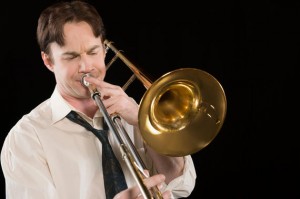Trumpet, Trombone, French Horn and Tuba Lessons
on the Main Line and Delaware County
Voted “Best Music and Dance Studio“
by the Main Line Times and News of Delaware County
Main Line School of Music and Dance Brass Program
If you have always been interested in playing the trumpet, trombone, French horn, or tuba, you have come to the right place. Whether you are beginner, or a budding professional, we can help you with your musical endeavors. The Main Line School of Music and Dance has helped thousands of students learn the skills that they need to enjoy music and dance for a lifetime. In the brass program at our Ardmore and Springfield locations, you will have the opportunity to learn your favorite songs, work on your school orchestra or band pieces, and delve into all of the techniques that will help to make you a fantastic musician. In the Main Line Music studio, you will learn how to properly hold your trumpet, trombone or tuba, use proper techniques, and make a crystal clear sound. We also focus on warm up activities, scales, arpeggios, note reading and improvisation. Additionally, we include techniques for staying in rhythm, counting beats, music theory, breathing techniques, posture (to help with breath support), increasing range, legato, slurring, vibrato and trills, improving tone and controlling volume. For work in your school band or orchestra, your brass teacher will help you with preparing solos for your performances, ensemble skills for working with other students, or polishing the pieces you will be performing.
Our Brass Instructors
The brass teachers at Main Line School of Music are patient, experienced and well-rounded. They each have degrees from accredited universities in music performance, education or composition and many of our brass teachers have a Master’s degree or a Ph.D. They also have experience with live performance and have played and taught a variety of styles of music including classical, jazz, current and other popular genres. We pride ourselves on having an excellent line of communication between the parents and the students and to be sensitive to the student’s interests, skill level, and style of learning. We also make sure that our brass teachers have a repertoire of books on all aspects of playing, reading and theory.
About Brass Instruments
Brass instruments fall into the category of wind instruments. These are instruments that are played utilizing a resonator, normally tubed shaped, that the player blows into creating a column of air that vibrates through the resonator. Brass instruments include the trumpet, coronet, trombone, French horn, tuba and baritone horn, and are played by the vibration of the players lips causing the vibrations in the instrument. Brass instruments are often played in orchestras, concert bands or marching bands. These instruments are widely used in jazz and blues music as well as in current popular music such as rock and R&B (rhythm and blues) and improvised solos are a part of the tradition of many of these instruments.
Brass Instruments Taught At Main Line Music and Dance
Trumpet, Coronet, Trombone, Baritone Horn, French Horn, and Tuba.
If your instrument is not listed here, please call and ask us if we teach it!
Why Choose Us For Brass Lessons?
- You will learn in a fun, low-pressure environment.
- Our brass teachers are entertaining, youthful and patient.
- Your brass lessons are individualized to your particular learning style.
- You can choose to play classical, rock, pop, jazz or any style that interests you.
- You are invited to perform in two (2) showcases each year.
- You can get assistance outside of your lesson so you do not lose any lesson time.
Five Ways To Get The Most Out Of Your Brass Lessons
1. Insist On Private Lessons When Learning a Brass Instrument
Group lessons work well for preschool music programs, choruses and theory lessons. However, when learning how to play a brass instrument, private lessons are far superior. In a private trumpet, trombone, tuba or French Horn lesson, your teacher can
focus all of their attention on you and this allows you to learn at your own pace. Additionally, your brass teacher does not have to instruct a class at a certain level, but has the time and focus to work on your strengths and weaknesses. This is beneficial to your teacher because they don’t have to divide their attention between five or ten students at one time. With private trumpet, trombone, tuba and French Horn lessons your teacher can help you be the best that you can be.
2. Help Your Child to Set Goals
Goal setting is one of the most important skills to develop in order to be successful on a brass instrument (and life in general). To be effective, make your goals specific, measurable, and attainable. An example of setting a musical goal for yourself would be to play a particular scale at a certain speed or to have a certain number of trumpet or trombone pieces memorized. Another goal might be to perform in a recital. Goals are always easier to achieve when you set a deadline for them. Try setting some goals of your own and watch your progress soar!
3. Make Practicing Your Brass Instrument Easier
As with anything else in life, improving on an instrument takes practice. One of the main problems with brass lessons can be the drudgery of practicing and the ensuing “fight” between parents and students to practice every day. Here are some ways to make practicing your trumpet, trombone, tuba or French Horn easier:
- Time. Set the same time aside every day to practice your trumpet or trombone so that it becomes part of a routine or habit. This works particularly well for children. Generally speaking, the earlier in the day your practicing takes place, the fewer reminders are required by a parent to get their child to practice.
- Repetition. We use this method quite often when setting practice schedules for beginners. For a young
child, twenty (20) or thirty (30) minutes seems like an eternity. Instead of setting a time frame, we use repetition. For example, practice this brass piece four times every day, and this scale five times a day. A student no longer pays attention to the amount of time they are practicing their instrument, but they do become aware that if they are on repetition three, they are almost finished.
- Rewards. This works very well for both children and adult students. Some adults reward themselves with a cappuccino after a successful week of practicing. Parents can encourage children to practice by occasionally granting rewards for successful practicing. In our school, we reward young children for a successful week of practicing with stars and stickers on their work, but praise still tends to be the most coveted reward. There is no substitute for a job well done. We also must realize that we are all human and sometimes have a less than stellar week of practice. In this case there is always next week.
4. How Young is Too Young. Starting at the Right Age
Adults can start any instrument at any time. An adult’s success is based on how willing they are committed to practicing their instrument. We teach many beginner brass students in their sixties and their seventies. For children, starting the trumpet or trombone at the right
age is a key element to their success. If a child starts brass lessons too soon, they may feel overwhelmed and frustrated and want to stop lessons. The last thing that you want to do is to turn a child off to music because they had one unpleasant experience (which could have been prevented). Sometimes if the child waits a year to start trumpet or trombone lessons, frustrations may be avoided and progress may be much faster. The following are some guidelines we have found to be successful in determining how young a child can start taking music lessons on a particular instrument.
- Bassoon – age 10
- Cello – age 10
- Clarinet – age 8
- Drums – age 6
- Flute – age 7
- French Horn – age 10
- Guitar – age 7
- Keyboard – age 5
- Oboe – age 10
- Piano – age 5
- Saxophone – age 8
- Trombone – age 9
- Trumpet – age 8
- Tuba – teenage and older
- Violin – age 5
- Voice – age 5
5. How Much Should I Be Reading the Notes? This is a very interesting topic. There are several different approaches to the study of the brass instruments. Some involve pure note reading and rhythms, while others utilize the ability of the ear. The bottom line is how well you play your instrument. This may be achieved by note reading, using the ear, or a mix of the two. If the brass teacher determines that you are a visual learner, an approach based heavily on note and rhythm reading with some ear training mixed in would work well. If the teacher determines that you are an aural (ear) learner, a program based heavily on ear playing tempered with some note and rhythm reading would be appropriate. The right frame of mind is crucial for optimal learning. Therefore, catering to your learning strengths will ensure that you get the most out of your trumpet, trombone or tuba lessons.
6. Bonus – Have Fun Playing Your Trumpet, Trombone, Tuba or French Horn
Trumpet, trombone, tuba and French Horn should be something that you enjoy for a lifetime. Try not to put unrealistic expectations on yourself or your children to learn too quickly because everyone learns at a different pace. The key is to be able to enjoy the journey.
Music Lessons (click below for link)
- Bass Guitar Lessons
- Brass Lessons
- Drum Lessons
- Guitar Lessons
- In Home Lessons
- Keyboard Lessons
- Piano Lessons
- String Lessons
- Voice Lessons
- Woodwind Lessons
Are All Music Studios The Same?
Studio Comparison List (click here)
REGISTER NOW FOR BRASS CLASSES!
Ardmore Location
692 Pont Reading Road
Ardmore, PA 19003
(next to John’s Sneakers)
610-658-5284
Springfield Location
353 Baltimore Pike (2nd floor)
Springfield, PA 19064
(next to Chuck E. Cheese)
610-658-5284
In Home Brass Lessons
These Main Line, Delaware County and Montgomery County trumpet, trombone, tuba and French Horn lessons are given in the convenience of your own home.
610-658-5284
 | |


